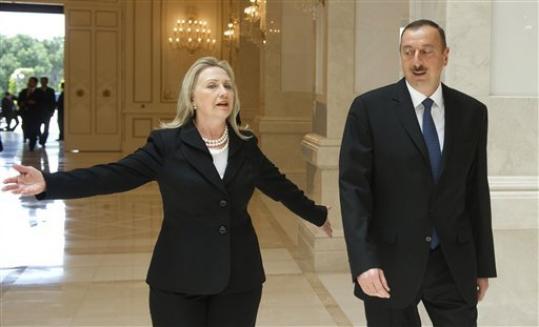
Clinton in Armenia and Azerbaijan: An Unedifying Valedictory
Publication: Eurasia Daily Monitor Volume: 9 Issue: 114
By:

US Secretary of State Hillary Clinton paid valedictory visits to Armenia and Azerbaijan on June 4 and 6, respectively, as part of a regional tour (including a comparatively successful visit to Georgia – see EDM, June 11, 12). Clinton had undertaken her get-acquainted tour of the region almost two years ago (July 2010). Between the get-acquainted entry and the valedictory exit, US policy toward Armenia and Azerbaijan, respectively, remained in the same state of confusion. Having lost its erstwhile strategic framework, the policy consists basically of unreciprocated Washington deliverables to Yerevan and unreciprocated Baku deliverables to Washington.
In the aftermath of Clinton’s visit, a Turkish-Azerbaijani-Georgian ministerial meeting in Trabzon, Turkey, demonstrated that the three countries pursue within their means the former US priority objective of turning the South Caucasus into a vital economic link between Europe and Asia (Anatolia news agency, Trend, Civil Georgia, June 8, 9).
In Yerevan, Clinton reactivated the US proposal for Turkey to reopen its border with Armenia for trade and transport unconditionally, without linkage to a resolution of the Armenia-Azerbaijan conflict. By seeking to break that linkage, this proposal encourages Yerevan’s intransigence in the negotiations on the conflict. Even while Washington was soft-pedaling that line recently, the US Embassy in Yerevan continued to promote breaking that linkage. In the wake of Clinton’s visit, the Embassy again urged Turkey from Yerevan to open the border with Armenia unconditionally, i.e. without linkage to the Armenia-Azerbaijan conflict-settlement process (Arminfo, Mediamax, PanArmenianNet, June 4, 5; Zaman, June 8).
Turkey and Azerbaijan have declared this proposal unacceptable many times over, from its first airing in 2009 to today. That Clinton should now re-issue this proposal to Ankara, using moreover an impartial party to the conflict – Yerevan – for a platform, rather than making her remarks from a neutral country, seems incomprehensible from a foreign-policy standpoint. It seems, rather, to reflect the Obama administration’s outreach to the US-Armenian vote in this election year. Aware, from past failures, that this proposal is an irritant to Baku and Ankara, Clinton kept silent on it during her visits to Azerbaijan and Turkey a few days later. Such discrepancy, while understandable as a self-inflicted predicament, makes US policy look incoherent.
Clinton has placed humanitarian considerations at the forefront of US foreign policy, generally. In Yerevan and Baku, however, she failed to comment on the largest ethnic cleansing operation in Europe and its borderlands: the eviction of 800,000 Azeris from Armenian-occupied territories within Azerbaijan (beyond the Armenian-inhabited Upper Karabakh). Clinton could at least have paid a symbolic visit to a refugee camp in Azerbaijan.
It was in response to that ethnic cleansing operation that Turkey closed its border with Armenia in 1994, in solidarity with Azerbaijan. Proposals to reopen that border unconditionally would split Turkey and Azerbaijan from each other and destroy their joint negotiating position. That position holds that Turkey and Azerbaijan would both open their borders with Armenia for trade and transport, conditional on Armenian troop withdrawal from inner-Azerbaijani districts and return of the expellees to their places of origin. That would also open the way for Armenia to be included in regional energy projects. This offer entails economic incentives for Yerevan to cooperate with a peaceful resolution of the conflict. If this economic lever is removed from the equation, Yerevan would be encouraged to keep its territorial conquests indefinitely, and Baku would find additional justifications for asserting its right to use force in self-defense.
Clinton’s visit coincided with Armenia-Azerbaijan border and frontline clashes resulting in approximately 10 killed on both sides. She called for mutual restraint but could offer nothing to advance a political solution. Washington (as well as Brussels) has basically delegated the lead mediator’s role to the Kremlin. In this context, it seems correct but insufficient to warn Baku that there can be no military solution to this conflict. As Azerbaijani leaders told Clinton, Yerevan seems content with prolonging the existing situation indefinitely. After all, the seizure of seven inner-Azerbaijani districts and the eviction of their populations are the outcomes of Armenia’s use of military force. To de-legitimize self-defense in a credible way would require de-legitimizing the forcible territorial conquests first. Clinton (reflecting a general Western position) warned Baku against resorting to a “military solution” to the conflict. Such warnings sound more effective and credible when phrased in pragmatic terms, referring to destructive consequences of war, rather than being phrased in moral-political terms while indefinitely tolerating the existing situation on the ground.
In Baku, Clinton handed letters from President Barack Obama and “other US officials” (presumably, Pentagon) to Azerbaijan’s President Ilham Aliyev (News.Az, June 8). At least some of the content relates to the transit of US and NATO supplies to the Afghanistan theater of war and back. The withdrawal of most of those forces by 2014 maximizes Azerbaijan’s role in the “reverse-transit” from Afghanistan in the short term. However, Azerbaijan will remain indispensable in the medium term for transiting supplies to residual US forces in Afghanistan (and possibly in nearby Central Asian locations) in the post-2014 decade.
President Aliyev made clear again that Azerbaijan’s territory will not be used by any party for operations against a neighbor country – i.e., hypothetically, by the United States against Iran. Tehran’s recent actions resembling psychological warfare against Azerbaijan have only strengthened Baku’s resolve to avoid being caught in a wider conflict beyond its control. According to the analysis from the Center for Strategic Studies under the presidential institution in Baku, tensions between Tehran and Baku are artificially being created by elements within the factionalized leadership in Iran (Trend, June 8).
Apparently recognizing the lack of credible opposition leaders in Baku, Clinton met with representatives of non- or less-politicized civil society groups involved in anti-corruption and transparency issues. But she also made a point of meeting with a local blogger who had just been released on parole, midway through a prison sentence for evading military conscription. Left unsaid on this occasion was the fact that the blogger and his Facebook associates had last year mobilized for a “Day of Wrath” in Azerbaijan, modeled on the “Arab spring” demonstrations.
On Azerbaijan’s side, deliverables include: energy deliveries directly to Washington’s allies; being an example of the successful secular development of a Muslim state; successful anti-terrorism and anti-WMD proliferation efforts; unlimited transit and passage rights on land, in the air, and at sea for US and NATO forces to and from Azerbaijan; troop contributions to US and NATO-led operations in Iraq, Kosovo and Afghanistan; investments in US government bonds; as well as massive purchases of US-made civilian airliners and space satellite technology. On the US side, however, deliverables seem far from commensurate thus far.




